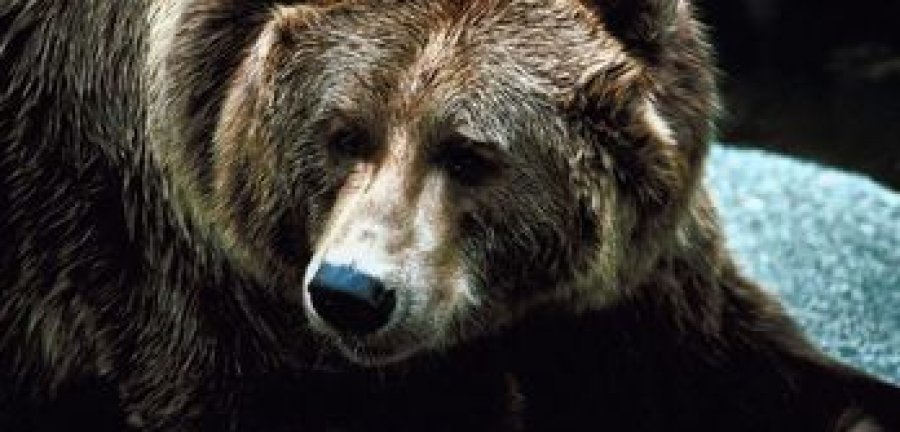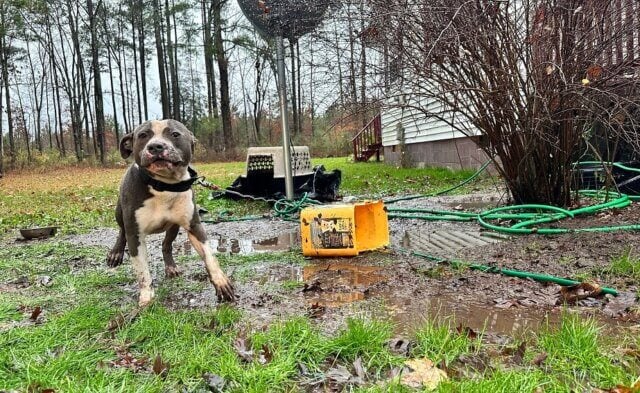Here is the second part of Prof. Marc Bekoff’s fantastic article, which was originally published in Psychology Today. You can find part one here, in case you missed it.
Many of the bears love to play, and this is an indication that they’ve substantially recovered from their trauma. When I visited the Moon Bear Rescue center in October 2008 I saw Aussie and Frank frolicking on a hammock. They were having a great time and it was incredibly inspiring to see these bears enjoying life. Jill and I shared their joy as we laughed at their silly antics. When Aussie saw Jasper ambling over he jumped off the hammock, approached Jasper, and they began roughhousing—caressing one another, biting one another’s scruff and ears, and falling to the ground embracing and rolling around. After a while Jasper went over to a water hole and invited Aussie in but Aussie decided to stay on the shore and watch Jasper play in the water. Tears came to my eyes. Not only were these bears telling one another that the day was going just fine but they were also telling Jill and me that all was okay. Much of the deep trauma that they’d experienced was in the past and whatever lingered wasn’t stopping them from enjoying themselves and spreading joy to other bears. Traumatized animals don’t play and surely aren’t as out-going as these awesome bears.
Jasper remains the peacemaker. He makes other bears feel at ease and that’s how I felt when I first met him. Perhaps Jasper knows what the other bears have experienced and wants to reassure them that everything will be okay now that they’ve been rescued. Jasper truly opens up his heart to everyone he meets. And, I think Jasper knows the effect he has on others. Jill told me that at a social function to celebrate their recent book Freedom Moon, Jasper stole the show. He always does — and he knows it. But there’s no arrogance at all —just trust and confidence that all is well and will continue to be so.
If one didn’t know what Jasper had experienced they’d never guess for it isn’t apparent from his behavior and spirit. Are Jasper and a few others special, and if so, why? Why did they recover and others didn’t? Bears, like dogs and other animals, display different personalities. Big Aussie still runs back into his den when he hears a strange noise or even when he sees a caterpillar in the grass. As an ethologist, I always want to learn more about each being as an individual, what hey feel, how they travel through life, and how they keep their dreams alive.
I wonder what Jasper, Aussie, and other moon bears carry in their head —what remnants of unspeakable abuse and trauma remain. Perhaps they also talk about how lucky they are to have been rescued and that not all humans are bad, that they can trust some of us. Many of the bears have been able to get over a lot of what they experienced, at least overtly, and depend on the trust, loyalty, and love that they’ve developed over time with the same mammalian species— human beings—who couldn’t care less about their well-being.
Jasper is the spokes-bear for forgiveness, peace, trust, and hope. I can’t thank Jasper enough for sharing his journey and his dreams. Jasper, like the dogs and cats who also need us, make us more humane and thus more human. The true spirit of humans, our inborn nature, is to help rather than to harm.
Expanding our Compassion Footprint
How Jasper and other moon bears recover from their unspeakable trauma is a lesson to us all for expanding our compassion footprint and for spreading compassion throughout the world. Jasper, Jethro, and other animals are constantly telling us their stories in moon bear, dog, cat, elephant, chimpanzee, mouse, and other species—sorts of ways. It behooves us to be mindful and to listen to their tales very carefully for we will learn a lot about them and also a lot about ourselves. The gifts that Jasper, Jethro, and many other animals have shared with me are priceless. I can’t put in words how indebted I am to Jasper and Jethro for letting me into their lives. I like to think I’m a better human being for gaining their generosity and trust. I also thank Jill Robinson and all the fine people at Animals Asia for their tireless commitment to rescue and rehabilitate abused moon bears and occasional dogs and cats. Thousands of bears still await rescue.
Henry, Stevie, Lobster, Matilde, and Butch
Another aspect of my last trip to China is worth sharing. I accompanied the moon bear team to the Qiming Animal Rescue Centre outside of Chengdu, China where I met dogs and cats who were rescued after the terrible earthquake that devastated large parts of the Sichuan Province in May 2008. I had already met two awesome dogs aptly named Richter and Tremor (AKA Rambo because as a small dog Tremor carried himself with the confidence of Sylvester Stallone) who had somehow survived the earthquake and were living at the rescue center. At Qiming there were many dogs who needed care and Heather Bacon, the chief veterinarian at the moon bear centre, performed some minor surgeries and gave shots and medications when needed.
We brought five dogs back to the bear centre for further care, as if the fine people working with the bears needed more work. I was asked to name the dogs so I did: Henry, Stevie, Lobster, Matilde, and Butch. I was especially attracted to Henry because he reminded me of Jethro, minus about 70 pounds. Henry had been caught stealing meat from a butcher and in turn had his most of his right front leg lopped off by the butcher. Somehow Henry survived and wound up at Qiming. Stevie was blind and had to have his eyes removed because they were terribly infected, Lobster also had a broken leg that healed and looked like a lobster claw, and Matilde weighed in at about ten pounds and should have weighed around forty. Butch had lost an eye in a fight with another dog and needed to have it removed. When I last inquired all were doing well and I was told that Matilde now weighs about 40 pounds and that Henry was jumping around like a kangaroo on his remaining legs.
There is no doubt that these dogs and the moon bears are incredibly lucky for having the attention of all the fine people at the rescue centre. The animals who I met and the people who help them selflessly are amazing beings. We can all be inspired by them and know that we must always keep our hopes and dreams alive. The good, the bad, the ugly, and our commitment to help those in need make us better humans. Compassion begets compassion. Through pain comes hope.





